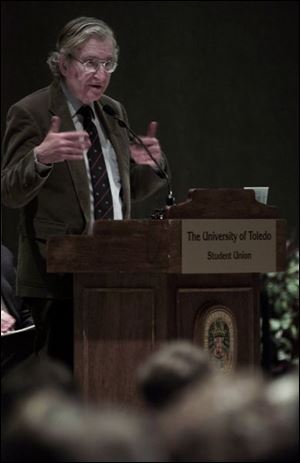
Apathy abets atrocities, scholar tells UT audience
3/5/2001
Too few U.S. citizens follow foreign affairs closely, renowned linguist and political dissident Noam Chomsky claims.
U.S. residents shoulder part of the blame for many of the worst human rights atrocities around the world in recent years, Dr. Noam Chomsky, a renowned linguist and political dissident, told about 1,200 people at the University of Toledo yesterday.
Not only has the country supplied many of the weapons used in horrific destruction, but it is rich and powerful enough to exert great control in almost every area of the world.
Why then does so much mistreatment and genocide happen?
Dr. Chomsky said it's because not enough U.S. citizens follow foreign affairs closely. If Americans knew what they were supporting in Turkey, for instance, he said the massive crimes against the Kurds would not have happened.
“That means you and I did it because the U.S. funds it,” he said of many actions that he believes most U.S. residents would abhor if they were aware of them.
He urged the standing-room-only crowd in the student union to study current events, demand more information on international affairs from the media, educate others about the country's role in conflicts around the world, and pressure U.S. leaders to work for peace and justice.
Dr. Chomsky, a professor of linguistics at the Massachusetts Institute of Technology and author of numerous books, is known as a philosopher and lecturer on international affairs and contemporary issues.
He talked for an hour, focusing on conflicts in Israel and Palestine, Iraq, and Turkey, and answered questions for a half hour. After the two-hour program, the first Maryse Mikhail lecture, he was surrounded by autograph seekers.
Mrs. Mikhail is a peace and justice activist who founded the Middle East Resource Center in Toledo.
“At the end of the speech, I was depressed,” said Soad Nimr, a Maumee physician who is from Egypt. “There is a lot of desperation.”
Dr. Chomsky did not have instantaneous solutions to recommend, but offered small steps to start mitigating some problems.
“I sort of came looking for an answer and realized there wasn't an answer,” said Nancy Merriam, director of medical education at ProMedica Health Systems, Inc.
While individuals in the United States have little control over foreign leaders who kill their own people, they are privileged to be part of a democracy that allows them to make a difference here. That is their influence over foreign injustices, Dr. Chomsky said.
“It was a really interesting challenge to us as Americans that the burden of peace lies on us,” said Sister Joan Michalik, a social justice advocate with Catholic Charities.